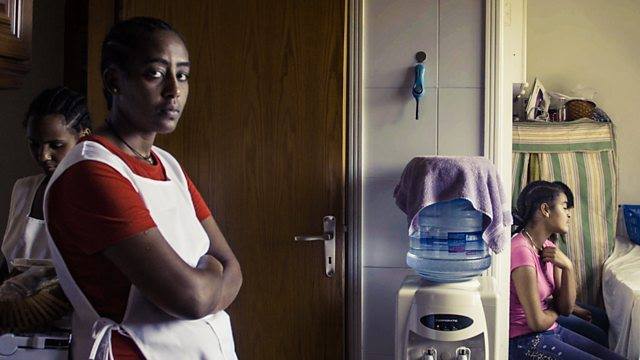'Maid in Hell': Why Slavery?

by Millie Goslyn-Jones
“No one should be held in slavery or servitude
Everyone has the right to freedom of movement”
The Declaration of Human Rights, United Nations, 1948
These are the opening lines of Maid in Hell: Why Slavery, a documentary revealing the disturbing truth behind domestic worker abuse in the Middle East. There are currently more than 2.8 million migrant women working in countries such as Jordan, Saudi Arabia and Lebanon, all trapped within the kafala system. Upon arrival, their phones and passports are confiscated, leaving them imprisoned by their employers and unable to contact their families. Many are physically and sexually abused whilst being held in servitude and systematically stripped of their basic human rights.
In the first few minutes of the documentary we are introduced to Maher Doubmit, a recruiting agent in Lebanon. He supplies agents with domestic workers from a range of countries. Proud of his work, he is more than willing to profit from the exploitation of vulnerable, migrant women. He defends the restrictive measures enforced by employers, such as the confiscation of passports, by going as far as denying the existence of human rights.
“I don’t think human rights exist in this world. No way.”
It is scary to think that this shocking statement is reflective of a wider general consensus. He says that the maids are ‘happy’, claiming that if it really was that bad then the women wouldn’t come.
But this is far from true. These women are driven to the Middle East out of desperation. The documentary shares the story of Mary, a domestic worker that travelled to Jordan to support her family in Kenya. After being there for 10 months, she was sent back home by her employers. They claimed that she was ‘sick’ but that it was nothing serious. However, on arrival it was revealed she had in fact received severe, full-body burns. Mary later died in hospital, leaving her four children and husband without an income. Her recruiters in both Kenya and Jordan refused to get involved and the identity of her employer has not been revealed. Mary never received any of her wages; she was the one who paid the price.
Sadly, this is just one story of many. In a shelter for escaped domestic workers, we listen to a number of women share their harrowing stories. They worked 18-hour days, were left unpaid and were physically and sexually abused. These women managed to escape, but many are not so fortunate. According to the Human Rights Watch, in 2008, 67% of domestic worker deaths in Lebanon were the result of suicide or falling from buildings.
Nevertheless, there are people fighting against this awful system. Emma Mbura, a Kenyan senator, sets herself up as the antithesis of people like Doumbit. While he is doing his best to deny human rights, she is busy defending them.
“We are not animals! There is no slave trade anymore.”
Having worked as a nanny in the Middle East herself, she has seen first-hand the inhumane treatment of domestic workers. Back in Kenya, she fights to get these women home along with their passports and wages. Last year, she launched a grassroots campaign to reinstate the ban in Kenya preventing its citizens from working in Saudi Arabia.
However, despite The United Nations calling for an end to bonded labour in the Middle East region, the kafala system remains in place. Governments and authorities are turning a blind eye to the abuse facing domestic workers as they continue to benefit from this heinous exploitation. These women’s human rights have been suspended and they have become objects in a lucrative business that can only be described as modern-day slavery.
